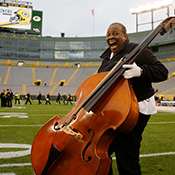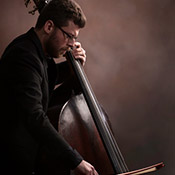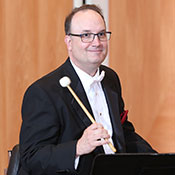
Never Stop Changing And Growing: Associate Principal Bass Andrew Raciti
David Lewellen
PUBLISHED
Tagged Under: Bass, MSO Musicians, Musician
Every musician has an origin story — how they chose their instrument or how it chose them. For Andrew Raciti, it was an injury and a high school orchestra director.
Raciti, the associate principal bass of the Milwaukee Symphony, grew up in West Allis playing the violin, but stopped at age 13 when he hurt his wrist playing football. By age 17, he was eager to start playing again, but Ron Melby, the longtime orchestra director at Nathan Hale High School, dropped off a bass at his house the week before school started.
“He probably could have dropped anything off. I was ready to play anything,” Raciti remembers. “But Mr. Melby said everyone always needs a good bass player.” He was right; Raciti quickly learned to play both acoustic and electric bass, and performed with jazz and pop ensembles (he still does sometimes).
During his senior year, he studied orchestral repertoire with MSO bassist Laura Snyder, who remembers him as “a prize student. You’d tell him or show him something, and when he came back, he’d have it down. He had a lot of talent. He still does.” Playing with him as an adult “has been great,” she said. “He’s a great player, very conscientious, but he’s not afraid to experiment, and some of his experiments end up sounding really good.”
Following his lessons with Snyder, Raciti went to UW-Madison, and then to graduate school at Rice University in Houston to study with Paul Ellison, a noted teacher who has “a big tree” of students around the country and the world.
Raciti extended that tree to Australia for five years when he played in the Sydney Symphony. Five years later, in 2006, he auditioned for his hometown orchestra and won the job. He and his wife, Rachel, had just had their first child, and it seemed like a good time to move closer to family. And he applied a lesson from an earlier audition, in which “I reached the finals, and then the jet lag kicked in, and that was it. For Milwaukee, I came in two weeks early.”
Also, transporting a bass halfway across the world is no joke. “We call it a bass coffin. It’s 7 feet tall and about 100 pounds,” Raciti said, “and you check it as extra luggage. It’s a miserable state of mind to watch from your seat on the plane as the baggage handlers load it.” He now drives to any destination that doesn’t involve an ocean.
Raciti is also an active teacher, spending two days or more a week at Northwestern University, where he is building his own tree of former students in the orchestral world. “I enjoy it when my students win an audition way more than I ever did,” he says, “and I take it harder when they don’t win than I ever did for myself. You can’t help it. You grow to love these people, you see them at their best, you know what they’re capable of, and you want them to be like that all the time.”
As a teacher, he has taken the time to study the history of his instrument. “Bass playing has changed a lot in the last 70 years or so,” he said. Basses were the last to switch from gut strings to steel strings, in the middle of the 20th century, and as a result, the accepted technique has slowly come to match the other string instruments more closely than it used to.
Raciti plays every summer with the Grand Teton festival in Wyoming, with players from many other orchestras. “My ears are always open,” he said. “I tell my students, steal from each other. Take the best of everything you see, and use what works for you. And that includes what they get from me. Not everything I tell them is going to work.” In mid-career himself, he uses the same approach. “Let skepticism be your second response. Try it first. As a teacher and as a musician, I can’t stop changing and growing.”



